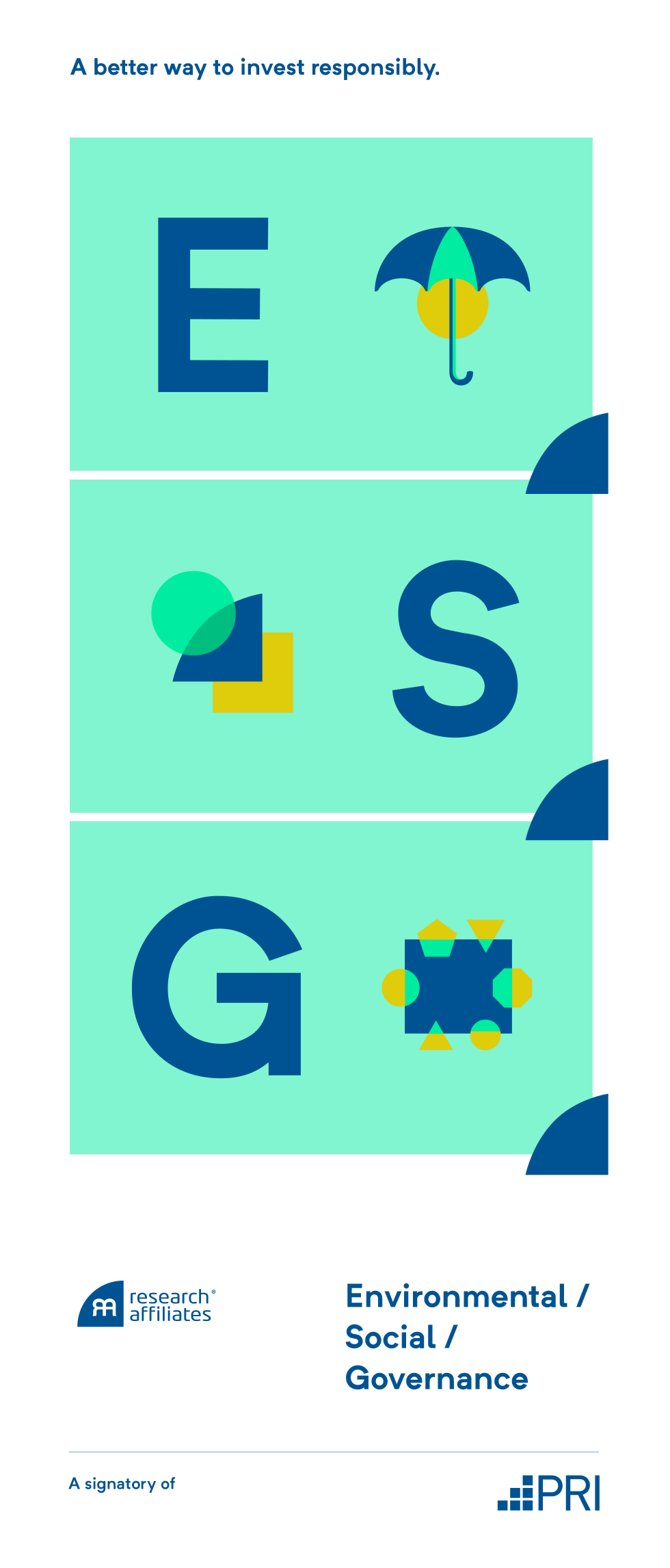ESG Investing at Research Affiliates
Research Affiliates and our affiliated entities support investors who wish to promote responsible environmental management, active social engagement, and good governance practices (ESG) with their investment choices. We define the elements of ESG as practiced by an entity as follows:
Responsible
Environmental Management
Performing as a good steward of the natural environment, measured using a broad array of environmental metrics.
Active
Social Engagement
Managing relationships with employees, suppliers, customers, and the community with respect and with appreciation of diverse viewpoints.
Good
Governance Practices
Focusing on long-term value creation and appropriately balancing the interests of a company’s many stakeholders.
We put responsible practices to work in our own day-to-day operations. We are committed to diversity in our workforce, an inclusive culture, and equality of opportunity for all, which in turn allows us to unlock the benefits of our diversity to achieve better outcomes through higher collective intelligence.
We are committed to environmental sustainability. As a result, we advocate resource conservation within our operations, support employee-initiated conservation initiatives, and seek to offer well-designed investment strategies that value responsible environmental management. We collaborate with our partners—data providers, index calculators, asset managers, and industry groups, for example—to offer well-designed ESG strategies for investors.
As a research-centric firm, we conduct ongoing research activities that extends our understanding—and the investment industry’s—of the benefits and challenges associated with ESG adoption to improve ESG practices both within and outside the financial industry. We seek to offer investment strategies that meet a diverse set of investor preferences, while delivering superior expected returns over a full investment cycle.
Our Research Into ESG
Given the fiduciary responsibilities faced by institutional investors, we recognize that the risk-and-return consequences of various ESG strategies are extremely important because they relate to investment outcomes. Thus, we are particularly interested in the research related to this issue. Our own research, as well as research by others, leads us to conclude that certain measures closely related to ESG tenets can be additive to returns and company performance, particularly as they pertain to governance and diversity.
We find that financial metrics related to corporate governance are associated with better investment performance as measured by low accounting accruals; conservative issuance and dilution practices; high profitability; and conservative investment. These metrics have been incorporated in multiple RA product suites since 2005 as well as in our dedicated ESG products.
At Research Affiliates, diversity has long been an important topic of research and crucial to the management of our business. Diversity in background, education, culture, frame of reference, and experience leads to diversity in thinking and ideas, and strengthens the foundation of our firm. A growing body of literature documents a positive relation between greater diversity and outcomes when measured as a level of collective intelligence and firm financial performance.
An academic consensus on the investment benefits of other ESG factors has not emerged. Our own research highlights some of the current challenges related to consistent data and lack of history. Research Affiliates believes, however, that thoughtfully designed systematic ESG strategies can improve performance and/or reduce risk while delivering on the objectives of ESG investing.
Integrating ESG
Research Affiliates created our first ESG index strategies in 2005 as custom indices for institutional asset owners to allow for the exclusion of controversial industries. In recent years we have gone further, creating investment strategies that further incorporate ESG metrics into certain index methodologies. A sampling of our ESG strategies include the
- RAFI ESG Index Series—Helps investors achieve the dual objectives of social responsibility and long-horizon outperformance through a thoughtfully designed smart beta strategy. This integrated ESG approach uses fundamental weighting and supplements traditional ESG metrics with both financial discipline and diversity for improved return potential. In addition, the index series excludes fossil fuel, weapons, tobacco, and gaming companies.
- RAFI Multi-Factor Climate Transition Index Series—Provides diversified exposures through allocations to the value, low volatility, quality, and momentum factors, while simultaneously incorporating specific objectives related to greenhouse gas emissions reductions and the transition to a low-carbon economy. The index is designed to meet the requirements for Climate Transition Benchmarks as specified by EU regulations.
- RAFI Fundamental Reduced Carbon Pathway Index Series—Reduces carbon intensity by a specific amount each year, creating a pathway for carbon-intensity reduction over time. This approach is designed for investors who wish to both retain the benefits associated with the Fundamental Index methodology and reduce the strategies’ exposure to carbon-intensity levels.
ESG Publication Series










